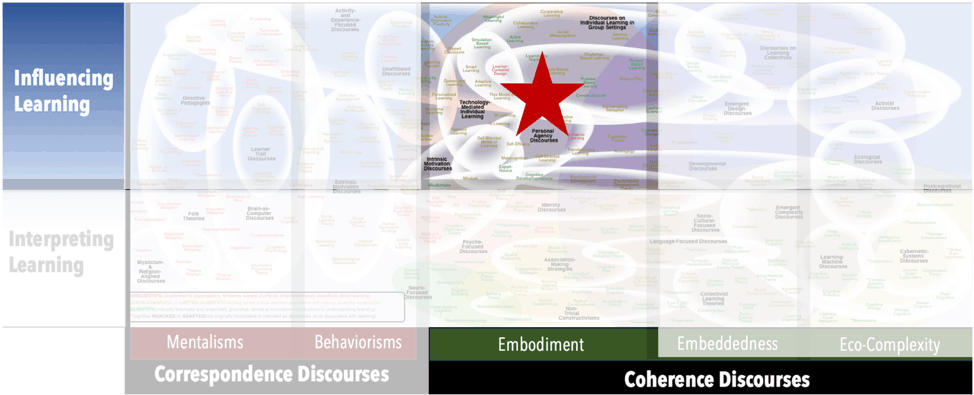AKA
Choice Theory
Focus
Helping learners to live a “good life”Principal Metaphors
- Knowledge is … responsible participation
- Knowing is … self-directed action
- Learner is … an agent (individual)
- Learning is … developing agency
- Teaching is … empowering learners
Originated
1990sSynopsis
Choice Learning begins with the assumption that one’s decisions and behaviors are oriented by a desire for a “good life.” The learner is thus seen as a self-directing individual who seeks to fulfill basic life needs – including physical needs that are encoded in the genome; survival needs having to do with nutrition, shelter, and security; and psychological needs around such matters as caring, acceptance, efficacy, pleasure, choice, and curiosity. Related discourses include:- Flexible Learning (Mare Gosper, David Rich, 1990s) – any model of formal education organized around a commitment to enable learners to personalize their experiences through choice of pace, mode, and location of learning
- Purposeful Learning (Learning for Purpose) (1980s) – often contrasted with “learning for show,” a variously defined notion that most often has to do with ensuring that the learner appreciates why they are being engaged with specific topics in the manners they are being engaged
- Student-Directed Teaching (Don Green, Anne Green, 1990s) – a model of formal education that emphasizes student choice, control, ownership and accountability
Different structures of choice-making are associated with different levels of cognitive demand and can lead to significantly different choices:
- Sequential Choice – making one selection (of a course, a book, a meal, etc.) at a time, and completing that selection before making the next
- Simultaneous Choice – making several selections (of courses, books, meals, etc.) at the same time, to be addressed over a prolonged period
- Boss Management (William Glasser, 1990s) – the setting of tasks and standards by an external agent/agency, usually without participant input and often in a coercive manner
- Lead Management (William Glasser, 1990s) – a collaborative, dialogue-based approach to defining tasks, standards, and roles, leading to clear-but-negotiable expectations that are managed and monitored by participants
Commentary
Choice Learning might be interpreted a mash-up of several currently popular topics of discussion that are clustered among Personal Agency Discourses and Motivation Theories. Its contribution is more pragmatic than theoretical, as it offers direct, step-by-step advice to educators on how to help learners develop senses of control over their lives while growing into responsible and productive members of society. Some critics point to a slight irony in this educational emphasis, namely:- Choice Paradox (Paradox of Choice) – the more choices one has, the less likely one is to be content with one’s decision
Authors and/or Prominent Influences
William GlasserStatus as a Theory of Learning
Choice Learning offers no new or innovative insights into how humans learn.Status as a Theory of Teaching
Choice Learning is properly understood as an educational attitude that is principally concerned with supporting the development of personal agency among learners. In that regard, it is properly described as a discourse on teaching.Status as a Scientific Theory
Choice Learning is more a philosophy of education than a perspective of learning. While arguably a sound emphasis for modern schooling, it meets none of our criteria for a scientific theory.Subdiscourses:
- Boss Management
- Choice Paradox (Paradox of Choice)
- Flexible Learning
- Lead Management
- Purposeful Learning (Learning for Purpose)
- Regulatory Focus Theory
- Sequential Choice
- Simultaneous Choice
- Student-Directed Teaching
- Value Belief Norm Theory (VBN)
Map Location

Please cite this article as:
Davis, B., & Francis, K. (2025). “Choice Learning” in Discourses on Learning in Education. https://learningdiscourses.com.
⇦ Back to Map
⇦ Back to List
